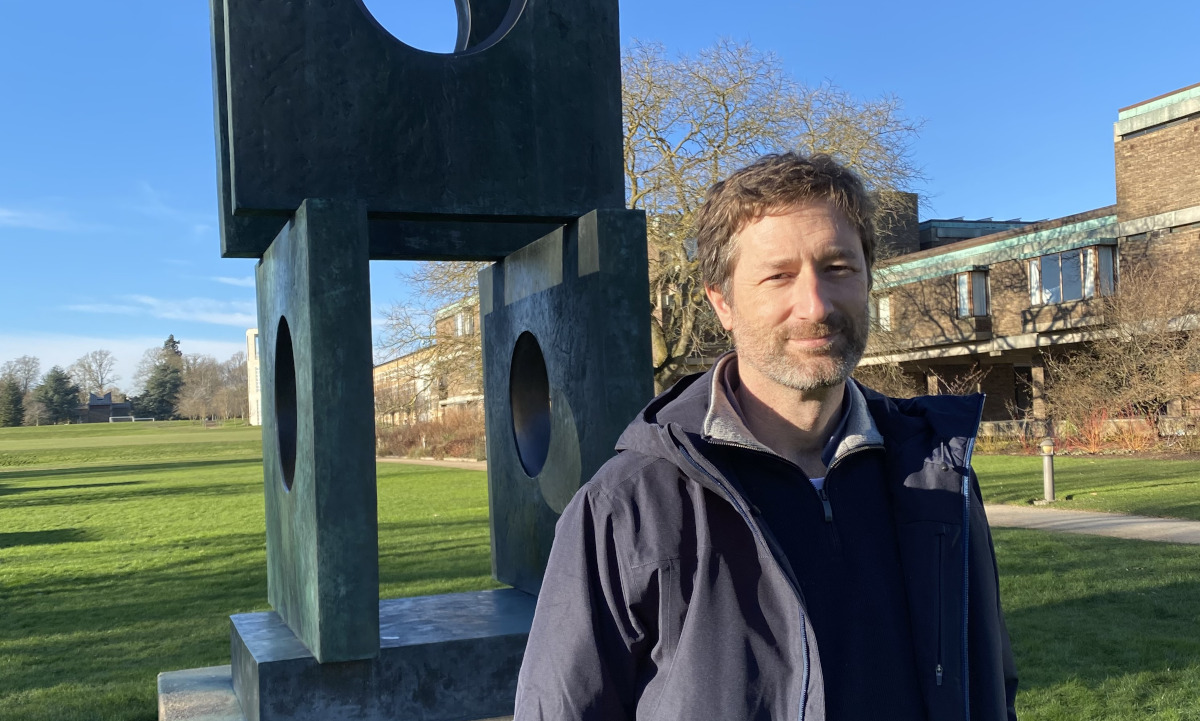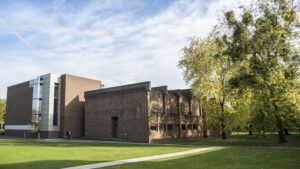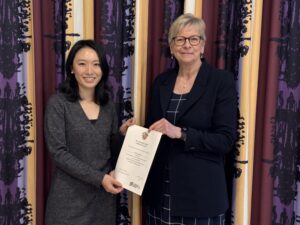French Government Overseas Fellows and By-Fellows have been a part of Churchill College since the scheme’s inaugural fellow, Dr Christian Colliex, first arrived in 1976.
The scheme was conceived in 1974 as the brainchild of the College’s first Master, Sir John Colville, in recognition of the “lasting admiration and affection for France” that he felt was held by Sir Winston Churchill. The French Government Fellowship scheme was created through an initial donation of 100,000 Francs from the French Government and with the College financing the shortfall.
The scheme flourished over the years as support for the Fellowship increased on both sides. This year marks the 50th Anniversary of the French Government Fellowship at Churchill and current and former French Government Fellows will be invited to celebrate at Churchill on the weekend of 19-21 July.
Meet Dr Cédric Maurange
Current French Government Fellow Dr Cédric Maurange is a developmental biologist and research director at the French National Centre for Scientific Research (CNRS), where he has led a research group at the Developmental Biology Institute of Marseille (IDBM) since 2009.
Born in Bordeaux, Cédric spent much of his childhood living in different regions across France and this early experience left him with an appetite for discovering new places. Following the completion of his PhD in Prof Renato Paro’s lab in Heidelberg, Germany, Cédric spent six years as a post-doc in Dr Alex Gould’s lab at the MRC National Institute for Medical Research (NIMR), now replaced by The Francis Crick Institute, before settling in Marseille with his family. Fourteen years on, and keen to share the excitement of discovering new places, new people and a new language with their children, Cédric joined Churchill College as a French Government Overseas Fellow. We met with current French Government Fellow Dr Cédric Maurange to find out more about his research as well as his experience of this unique fellowship.
What is your area of research?
I am a developmental biologist, which means that I try to understand how tissues are made from a small pool of stem cells in the embryo. I mainly focus on the stem cells in the brain although I have interests in other types of stem cells. By deciphering the genetic programmes that regulate stem cell activity in the developing brain, we discovered that mis-regulation of these genetic programs during specific temporal windows could cause brain tumours. We believe this is reminiscent of what initiates and propagates brain tumours in children so we now put a lot of effort into deciphering further the rules that regulate tumour growth in children.
What inspired you to develop an interest in this subject area?
I have always enjoyed biology and particularly all things gene-related. During my studies in the 90s there emerged progressively the idea that a common set of genes was used in all animals to grow from an embryo to an adult. That meant that using animals as “simple” as worms and flies, one could make discoveries highly relevant for humans, for example revealing the basic principles of embryonic development and diseases. This is a direct consequence of the theory of evolution conceptualized by Charles Darwin.
When I visited Prof Renato Paro in 1998 for a PhD interview in Heidelberg, I was struck by the way his lab was using genetic engineering in the fruitfly Drosophila to understand in unmatched molecular details how genes were regulated during embryogenesis. I realised that Drosophila was a fantastic model organism to do all sorts of in vivo experiments without raising too many ethical problems. I felt in love with this model organism, which I still use as a main model for my research, although we are also trying to translate our discoveries in vertebrates and human now.
What attracted you to apply for a French Government Overseas Fellowship at Churchill?
Cambridge is such an inspiring environment for researchers. There are so many brilliant minds thinking about how the world works and trying to decipher the rules that govern the universe and societies… Moreover, there is an outstanding community of molecular biologists, some of them using tools and technology that I was interested in to investigate how a couple of genes I am particularly fond of, are regulated. I thought it would be great to come for a sabbatical in order to learn some techniques and test some of my hypothesis. I was lucky enough that Prof Sarah Bray at PDN agreed to host me so that we could work on a project together. Unfortunately, there are very few funding opportunities to help researchers to move abroad with their family for several months. A colleague of mine talked to me about the French Government Overseas Fellowship at Churchill which provides an accommodation for the whole family together with the possibility to meet the community of fellows and participate to the life of the College. We were enthusiastic about the opportunity, and I applied with great hopes.
What have you enjoyed most thus far and what are you most looking forward to?
It is a unique experience for me and my family to live an academic life in the heart of a College. Churchill is a fantastic place because of the wonderful grounds and gardens resplendent with trees, and all the activities organised for those with families. The location is so peaceful and yet so close to the city centre where I go to work every day. We have been lucky to attend some of the public seminars at the Astronomy Institute and see Saturn and Jupiter through the telescopes with my 9-year-old daughter, listen to musicians on Friday evenings, or attend seminars in College. I have also enjoyed, sometimes with my wife, high table dinners, which provide an opportunity to meet Fellows from all areas of research and is also a deep dive into Cambridge traditions. I am now looking forward to the spring season when all of nature will be in bloom. It will certainly be a spectacle at Churchill, thanks to the incredible work of the gardeners.
Can you describe the experience of living on-site at Churchill College with your family
This is a true family experience and it’s amazing to see how rapidly my two daughters have adapted to their new school and new life, and to see them progressing in English. I think this will be a milestone in their childhood that will help to shape their future.
What are your expectations about this sabbatical?
I was warmly welcomed in Prof Bray’s lab and we are testing some of the tools we have generated. I hope our results will lead to an exciting collaboration. In addition to the opportunity to meet many brilliant scientists, learn new technologies and topics, and develop new projects, this sabbatical is a time to reflect on my past, present and future research, and to be inspired by the spirit of the giants that haunt the city.
French Government Overseas Fellowships
The purpose of the French Government Fellowships is ‘to promote visits by French scientific research workers to the University of Cambridge while allowing them to profit by the multidisciplinary environment provided by the College surroundings’. In addition to dining privileges there is an entitlement to accommodation in College, for which the charges are met by a grant from the French Government.
There are now 2 or 3 Fellows or By-Fellows awarded under the scheme each year, for periods of 6-12 months. The addition of By-Fellows dates back to around nine years ago when the College persuaded the Counsellor for Science and Technology at the French Embassy, that it would be good to extend the opportunity to younger French researchers. The Fellowships are advertised annually in France, normally in February or March and the College liaises closely with the Counsellor for Science and Technology at the French Embassy in submitting nominations to the Fellowship Electors.




